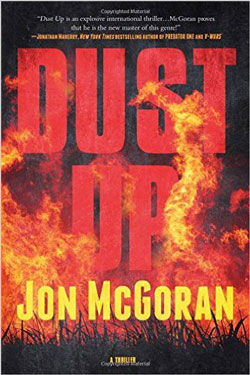 Dust Up by Jon McGoran is the 3rd Doyle Carrick ecological thriller that finds Doyle in Haiti, investigating a murder and its connections to a big biotech company, Energene.
Dust Up by Jon McGoran is the 3rd Doyle Carrick ecological thriller that finds Doyle in Haiti, investigating a murder and its connections to a big biotech company, Energene.
I’m not sure what the last biotech or eco-thriller I read was—which is my knavish way of saying I've never read one, or if I had it didn’t leave much of an impression—and I’m not necessarily drawn to such subgenres. But as I made it to the page-69 litmus test of Dust Up (from the Doyle Carrick series, appearing on Amazon's Thriller & Suspense chart), I was rapt by the suspenseful plot, in no small part because of the crime/detective elements, which struck me as owing a debt to Raymond Chandler—and more specifically Ross Macdonald, who took Chandleresque themes and fused them with even greater moral complexity. Here’s an example of their hardboiled form from McGoran’s novel:
Nola opened her eyes and watched him go, then squeezed her eyes against her tears. I understood. The blood being rinsed off our steps was the last of Ron Hartwell. Dead is dead, but when your blood has been washed off the sidewalk and down into the sewer, you were erased. Dead and gone.
Ron Hartwell was murdered outside of Doyle and Nola Carrick’s residence. Doyle, straightaway, runs afoul his superior (a leading P.I. staple) Lieutenant Suarez, who not only has had it in for him, but has already assigned the case to a screw-up named Mike Warren.
Of course, any fictional detective worth his salt goes in search of the truth, and Doyle Carrick is no exception, eventually taking him all the way to Haiti. He learns the name of the woman he spotted leaving the crime scene is Miriam Hartwell, wife of the murder victim, only she has disappeared. Warren is quick to implicate Miriam as the culprit, especially after the murder weapon is conveniently found at her place, neatly wrapping up the case in the eyes of the department.
Doyle isn’t so convinced. With his further investigation, he finds both Ron and Miriam had worked for a big biotech company called Energene Corporation, and with little proof, Energene accused Ron of industrial espionage—though he doesn’t fit the profile. Adding to the incongruities, Doyle discovers Miriam was receiving fertility treatments to have a child, and Ron's mother and brother paint a happy picture of the couple.
Doyle is about ready to throw in the towel, figuring it’s time to move on (a minor misstep in narrative—despite all of his work and family pressures, I never thought for a moment that Doyle would stop pulling on the thread), when Miriam comes out of the woodwork, approaching the detective with a tale of what is really happening.
Mr. McGoran's author bio states that “he has written about food and sustainability for twenty years” and that knowledge comes through in this novel in bitesize morsels…never too much to weigh down the plot, but enough to add necessary spice and texture. And, never far away is the thumping heart of the detective genre:
Axe-Man was down on his hands and knees, his hand still holding that gun. He was wearing a fancy suit—not necessarily a good one, just a flashy one—and a lot of product in his hair. He was young, which could have been why he went to the trouble of using a silencer and then broadcasted his presence with so much body spray. I stomped hard on his gun hand and slammed my knee into his face. He collapsed to the floor and let go of his gun. I kicked it down the hallway.
I feel obliged, for the first time, to insert myself into the proceedings. Back in 1994, as a military policeman in the US Army, I was deployed to Haiti as part of President Clinton’s Operation Uphold Democracy to return Jean-Bertrand Aristide to power. From the instant we landed at the airport to cheering crowds, I was taken in with the kind people who were non-reticent in approaching us with thanks and their desire to share thoughts on their country. Reading Dust Up took me to that time with McGoran’s credible descriptions of the people, land, and continuing suffering—exasperated by the recent spate of tropical storms and hurricanes. Kudos to Mr. McGoran for his genuine rendering.
On the day I finished reading Dust Up and began preparing this review, several top news stories caught my eye: Flint Michigan residents facing a public drinking water crisis, Miami’s oceanfront nuclear power plant is leaking, and Chernobyl locals eating radioactive food 30 years after the disaster. It goes to show Mr. McGoran’s writing is more timely than ever, and it seems like I’ve picked a revelatory time to read my first biotech thriller.
To learn more or order a copy, visit:
David Cranmer aka Edward A. Grainger is the publisher and editor of BEAT to a PULP books and writer of the forthcoming The Drifter Detective #7: Torn and Frayed. He lives in New York with his wife and daughter.

Another fine review, but it hasn’t convinced me to leave the western genre – yet. But, Dust Up does sound mighty interesting.
David, it was interesting to learn that you were a military policeman in the US army. I have only seen them in the movies. Biotech and ecology sound like a good premise for a novel, and contemporary too, though I can’t say I have read one, not counting pharma-medical thrillers. I liked the author’s narrative style.
[b]Oscar[/b], This would be a good supplement to your Western diet. 🙂
[b]Prashant[/b], Jon McGoran is a good place to start for a biotech thriller–at least it was for me. So many similarities with the detective novel.